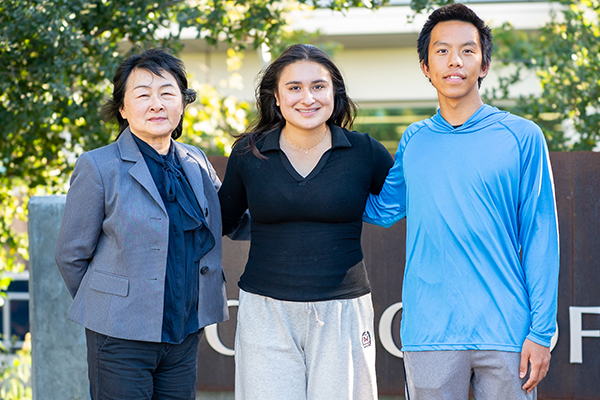 For the second time in three years, West Valley College students coached by Math Instructor SerKuang Chen have captured first place in the national Student Research League competition.
For the second time in three years, West Valley College students coached by Math Instructor SerKuang Chen have captured first place in the national Student Research League competition.
The competition, organized by the American Mathematical Association of Two Year Colleges (AMATYC), pits dozens of teams composed of two to three students against one another in applying their mathematical problem-solving, collaboration, and analytical skills, and creativity to a real-world scenario.
The 2024 challenge: Create a theoretical plan for transitioning a city of at least 50,000 residents to using 100% renewable energy.
Chen paired up two talented WVC math students and credits them for their diligence, noting that competitors had only 18 days from when organizers released the 2024 SRL challenge on March 18 and the April 8 deadline. Their final 15-page proposal advanced through multiple regional judging phases before their nationwide win was recently announced.
“Winning felt amazing, and I was fortunate to have such a supportive teammate who complemented my strengths and filled in for my weaknesses,” said Ariana Chanel Lalehparvar, a second year data science major and Associated Students of WVC executive board member.
Lalehparvar and her teammate, Kirby Fung, hadn’t met before their faculty mentor Chen introduced them.
Fung, is a WVC dual enrollment student and senior at Saratoga High School, where he plays varsity water polo. Winning the SRL competition, he said, stirred a strong sense of honor and pride for "our collective effort and teamwork.” For their research, the team studied renewable energy sources from geothermal to landfill gas and conducted an in-depth analysis of the existing benefit-cost ratio and potential costs and savings over time.
“Equipped with the analysis, I devised a linear programming optimization model to generate optimized energy distribution output based on a customized target function and list of constraints,” Fung explained. “I’ve also utilized computer programming to implement the optimization model in Python and created the graphs and tables for our research paper.”
He extended gratitude to Chen and to WVC Math Instructor Brad Chin. A member of the WVC Sustainability Committee, Chin connected the team to Jim Stack, resource officer at the City of Palo Alto. Stack acted as a consultant and supplied helpful real-world data to Fung and Lalehparvar. Team members also expressed appreciation to Betsy Sandford of the West Valley library who met with students after hours to orient them to research resources.
Judges complimented the WVC team’s thorough comparison of different energy sources and effective use of technology, such as Python computer programming language. They also applauded the team’s implementation strategy with recommendations to the Palo Alto City Council as a “great idea.”
“If I was an employer looking at what they’ve done, I’d want to hire Ariana and Kirby,” said Chin, who facilitated interactions with Stack and reviewed their draft proposal. “It shows what they’re capable of. It takes them so far beyond what the typical educational path would be.”
Chin also noted that without Chen’s initiative and time commitment, winning the nationwide competition both times West Valley teams have entered wouldn’t be possible.
Chen, a retired software engineer who is beginning her seventh year as fulltime WVC math faculty (her ninth in the department), met Chin during her retraining to become an instructor. Her second career journey required her to earn a second master’s degree and take every math class she now teaches students.
“What she’s done in taking students to the level of achievement for students to succeed at this kind of assignment is really next level,” Chin said. “I see in her the consistent support she provides to students, and she inspires me.”
For her part, Chen says she was motived by “some amazing students” to seek out opportunities to “showcase them somewhere.”
Her previous three-member team put approximately 100 hours into their three-week project. They went on to transfer to University of California, Berkley, UCLA, and San Francisco State.
“It’s rewarding both for faculty to sponsor students and for students to participate,” Chen observed. “After the first time, I (thought): I’m done! Then, I see really amazing students, and I do it again.”
